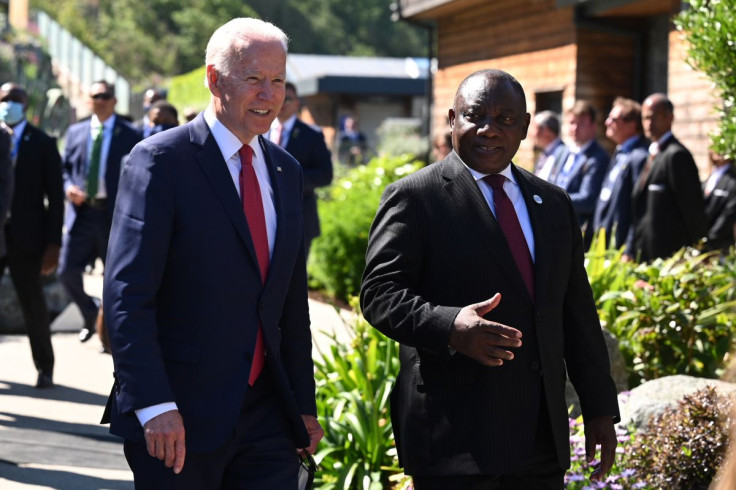Biden’s Summit Aims To Wean Africa Away From China And Russia

Former U.S. President Barack Obama had a special place for Africa which was disregarded by his successor Donald Trump.
However, the current incumbent Joe Biden is expected to soothe the sneering dislike of Trump by taking a leaf out of Obama's book by hosting the second round of the U.S.-Africa summit on Dec. 13.
Obama tried to woo Africa to the U.S. camp with the historic summit in 2014 after China consistently outpaced the U.S. as the largest investor in the continent.
His administration offered investment worth more than $17 billion in the 2014 summit to see that development programs in Africa are going in tandem with rule of law, regulatory reforms, and good governance.
Since the U.S. still views China as its main long-term challenger, Chinese benevolence in Africa still looms large over Biden's policy. Besides, African leaders have been holding summits every three years with China.
China has been Africa's largest trading partner for 12 years, with total bilateral trade between China and Africa reaching $254.3 billion in 2021, according to the General Administration of Customs of China.
Out of 35 countries that abstained from a United Nations vote in March 2022, condemning Russia's war with Ukraine, 19 were African nations. South Africa's position, in particular, became too problematic for Biden due to the size of its economy and its moral authority throughout Africa. Besides, Pretoria is the only African member of the G20.
Biden's new-found love for Africa is motivated to convince African leaders that neutrality is not going to pay any dividends in the future for the continent, where the West is now pushing for more oil and gas drilling in the conflict with China and Russia, which has increasingly flexed its muscle, helping to defuse tensions in hotspots and rallying public opinion to blunt pressure over the Ukraine war.
Earlier, this role was played by France, which has military bases in many parts of Africa and is an active participant in various military conflicts in the continent. In the changing realities, France, backed by the U.S, has proved little control.
The head of Russian diplomacy, Sergey Lavrov, is getting ready for another round of continental tours next year.
The foreign minister visited four African nations in July to garner support for Russia for its special operation in Eastern Europe. Lavrov paid a visit to Egypt, Congo-Brazaville, Uganda and Ethiopia then. His next destinations are eight countries on the continent and Morocco has already confirmed it.
Russia is also leaving no stone unturned to host the second Russia-Africa summit in St Petersburg, scheduled for July 2023. The vital point of discussion is going to be food and energy security. The resort city of Sochi hosted the first summit, attended by 43 African heads of state.
"We believe that this is a decisive decade. The way in which the world will be ordered will be determined in the coming years," said Biden's top Africa advisor, Judd Devermont.
Biden may announce a slew of investments at the three-day summit in Washington to address food security -- worsened by the invasion of Ukraine - in the continent. He may go to the extent of offering an African seat on the Security Council and will facilitate the way for the African Union to formally join the Group of 20 major economies, reported AFP.
Since the sequel is taking place in Washington after a gap of eight years -- the equivalent of two U.S. presidential terms - Biden is expected to roll out the red carpet.
Amid the soured trade ties with the continent, many African leaders are still in the dark and are worried about the fate of the African Growth and Opportunity Act, -- the 2000 U.S. law that grants duty-free access to the U.S. market for products from sub-Saharan nations that have a notable record on human rights and democracy.
The law expires in 2025 and Biden will come clean on this at the summit.
Nearly 50 African leaders have descended on Washington to attend the summit aimed at Biden's commitment to revitalizing global partnerships and alliances in the 21st century.
On Dec. 14, the President will deliver a talk at the U.S.-Africa Business Forum and later will host a multilateral meeting to wind up the day with the U.S.-Africa Leaders' Summit Dinner in the East Room of the White House.
The next day, he will continue his participation in the Summit while leaders talk about sustainable development based on a pan-African agenda like African unity, self-determination, freedom, and collective prosperity. He will also pose for a family photo with the leaders.
For the first time, Western Sahara, a disputed territory in the Maghreb region of North and West Africa, is not included.
In all, Western Sahara, Eritrea, Somaliland, Sudan, Guinea, Mali and Burkina Faso are excluded.
Sudan, Guinea, Mali and Burkina Faso are suspended by the African Union following coups and counter-coups. With Eritrea, the U.S. does not have diplomatic relations.
So, 49 African heads of state and the chairperson of the African Union Commission are in the U.S.
Since the Ukraine war, geopolitical dynamics in Africa have, however, been altered with the Russian-French rivalry as opposed to the Chinese-American competition.
The U.S. knows for sure that it simply cannot compete with China in terms of investment in Africa because of domestic economic issues and those in the European Union (EU). But it wants to check Chinese economic success and Russia's military penetration in Africa. So, Biden will do what the U.S. is famous for -- military engagement all over the African continent -- to take on the China-Russia axis simultaneously.
























